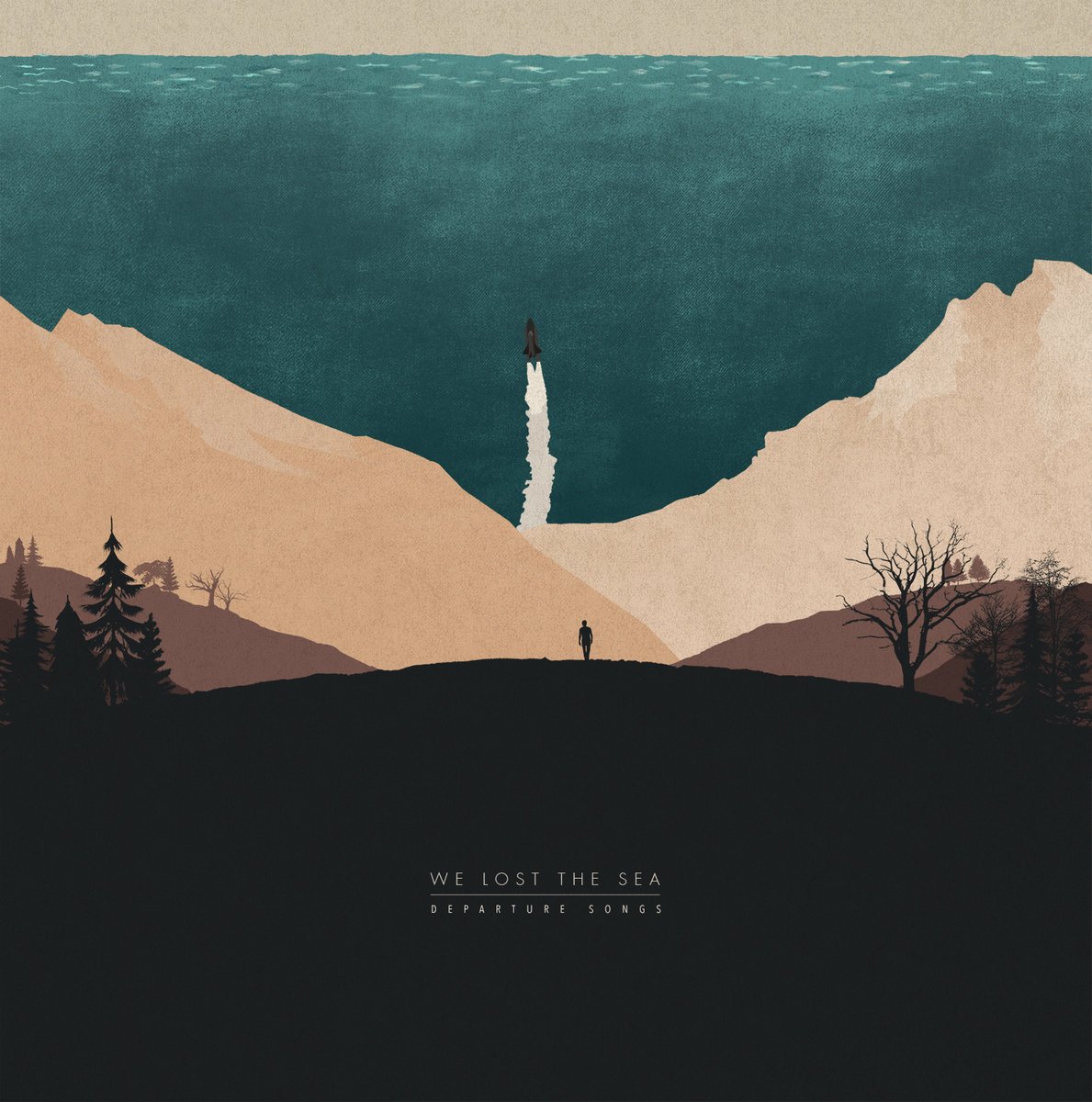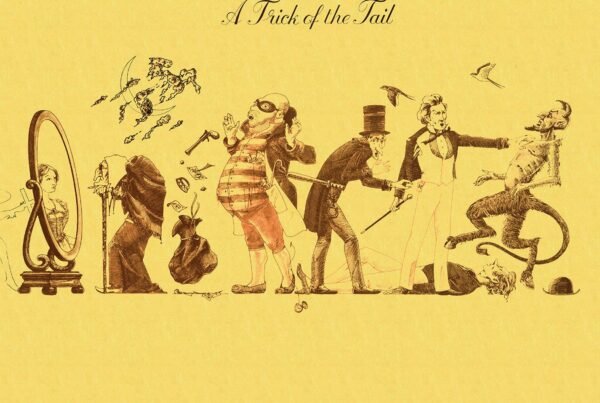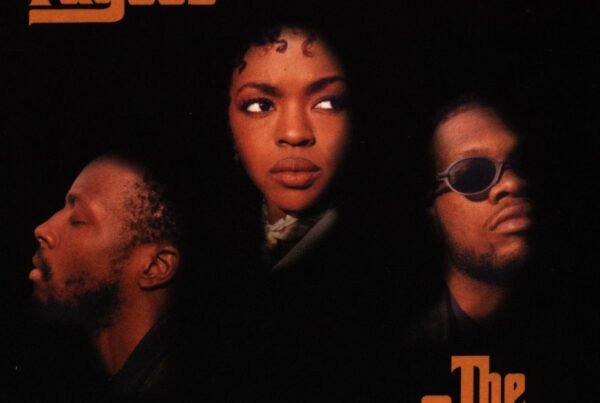Loss – it’s a tragic reality, the most universally crushing revelation of our short time on this wonderful blue planet of ours. Who wouldn’t want their loved ones to persist into eternity? Who would gladly leave their prized possessions and precious memories behind them? Nobody, that’s who, and yet we’re all faced with the grim prospect of having to do just that, over and over, until one day our own flame fades and others are left to feel the loss our our passing in our wake. It’s a painful sting in every cherished moment, yes, but it can yield so much in terms of gratefulness and self-realization if we allow ourselves the time to process it.
Case in point, We Lost The Sea‘s Departure Songs is perhaps the epitome of musicians eulogizing a late friend and band mate who passed on before their time. Filled to the brim with stories of loss, failure, and persistence in the face of unlikely survival, it’s one of the most emotional experiences post-rock (or any genre, for that matter) has to offer. I’ve invited my fellow EIN members Jean Pierre, Rodrigo, Xander, and Peter to share their own unique perspective on this monument to loss and grief – you can find them below.
Jean Pierre Pallais
With all the instrumental post-rock records out there, it is difficult to find out which ones are worth sitting through. So many of them are cool and sound great, but their replayability is very weak. When you do get the itch to go for that post-rock vibe, you want something that you know is mesmerizing. For me, that record is We Lost the Sea’s Departure Songs. This is the one post-rock record I will always find myself going back to, now and forever. Every single playthrough leaves me an emotional wreck, as much as it did the very first time I heard this masterpiece. I don’t anticipate that will ever change.
More often than not, you can vividly remember the first time you listened to a particular song or record. This association is much stronger if you were doing something you don’t normally do while listening to that piece of music for the first time. I personally don’t go to coffee shops very often, but one early Saturday morning, I went to one so I could get some studying done. I needed a change of scenery from the dark, desolate bedroom during my studies. The coffee shop was my next move on this fateful day.
Since I was in a noisy coffee shop, I had to put on some tunes of course, to drown out the sound. I went with post-rock, because of the pretty passive, chill nature of the music that wouldn’t distract me too much while hitting the books. At this point, I’ve been meaning to get to Departure Songs and figured this was ample time to do so for whatever reason. What an amazing yet terrible impromptu choice that was, one that I will forever associate with my local coffee shop on a Saturday morning.
Departure Songs isn’t like any other post-rock record if you couldn’t already tell – despite being purely instrumental, this album beautifully tells a story in each song, stories that many albums with vocals couldn’t even come close to telling with such passion and vigor. I fully experienced all the emotions being portrayed in the songs without knowing at all what they were about at first. There I was, in that busy coffee shop, trying not to emotionally break down in front of everyone. It was a beautifully moving and captivating experience that I only partially regret having in public. Looking back, had I not experienced this record for the first time in such a way, I probably wouldn’t have such a strong connection to album as I do now.
After being completely awestruck with just the music alone, I did a little digging into what this album is all about. Departure Songs is the first record since We Lost the Sea’s late vocalist Chris Torpy passed away. This record was a special way to carry on his legacy, to honor his life. Each track is the retelling of an event that lead to death in one way or another. These are stories of pure bravery, selflessness, ambition, failure, and – most importantly – loss. This album is special is more ways than one, and I am sure Chris would be ecstatic about what his brethren in We Lost the Sea crafted in his honor.
If you haven’t listened to this record yet, I won’t spoil any of the music for you; it truly is something you have to experience for yourself. The one thing I will say is that the final moments of “Challenger Part 1” is as close to an out-of-body experience you can get without the consumption of any substance whatsoever. That song makes me feel things I haven’t felt before. Now imaging feeling that first time ‘high’ in a public setting… it is something I wouldn’t have let happen willingly, but it was a happy accident in hindsight that I wouldn’t ever take back.
This particular style of music, due to its long, drawn-out nature, is one that takes plenty of patience and effort to enjoy to its fullest – that much I will not dispute. Although Departure Songs puts your patience to the test, the payoff is so grandiose that it makes it worth it one hundred times over. If post-rock hasn’t necessarily clicked for you yet, or you just want something undeniably gorgeous and depressing to lose yourself into, you’ve come to the right place.
Rodrigo Torres Pinelli
The moment this feature was announced to us, the writers, I immediately felt compelled to be part of it. This album has given me so much, the least I could do is to share a few words on it. Departure Songs is easily my favorite post-rock album. I have not found any album that could match the emotional impact it had on me so far.
I like to believe that music comes to you and not the other way around. It comes to shed light on your life, your way of conceiving your surrounding realities and beyond. When you let the music take part in the construction of your identity, the emotional thread that bonds the artist’s craft and your inner self becomes fundamental and irreplaceable. There is nothing like it, you know? It even feels a little addictive – you end up yearning for that emotional connection so dearly embracive. Once Departure Songs gets through to you, no album can assimilate the same degree of tragic yet harmonious melancholy.
See, when I discovered this record, I was a post-rock rookie. Still am, though. Tortoise‘s Millions Now Living Will Never Die and Explosions in the Sky‘s The Earth is Not a Cold Dead Place were my only jams. Yet, it was enough to understand the depths this genre is famous for. Out of curiosity, I found the Live at Dunk Fest series. Can’t really recall which one was the first I heard, probably Russian Circles‘. These albums vibed but no one got to such a point. When I stumbled upon Departure Songs‘ live rendition, it was like walking into a sandtrap, there was no way to escape what was coming. I recall becoming slightly hypnotized while enjoying “A Gallant Gentleman”’s guitar parts. Its rhythm left me suspended, lighter than a feather. It was the beginning of a new level of conscience.
Once the first listen was on the books, there was a slight pain in my chest. I was hurting – figuratively, of course. However, that sensation’s realness was undeniable and confusing, too. Why would anyone put themselves through a piece of music that left you half-broken? What did this band experience to achieve such a level of profound desolation? I could not help myself but investigate We Lost The Sea and this album, precisely. That’s when I learned about the band’s history and the stories behind each song, turning this process into an extra-musical experience. Then, answers for the previous interrogatives started to crystallize.
The whole point of this record will forever remain unbeknownst to people outside the group itself. Nevertheless, the clear depiction of grief is maybe we might all agree upon. Each element works in the way it’s meant to, conveying the heavy-hearted soundtracks to these tragic tales. Therefore, what makes Departure Songs so important for dedicated listeners is the full concept. They now have all the tools required to recreate the unfortunate events in their minds; they can visualize David Shaw’s struggle underwater, Challenger’s explosion, Oates’ final walk, and the music is the perfect fit for each scene. It takes skill, wisdom, and heavy sensations to pull this off. We Lost The Sea‘s great tribute and goodbye to their late friend and singer, ladies and gentlemen.
Peter Mattenet Riva
There isn’t any real way I can describe my fervorous, unyielding love for this record, without having to explain why I had disliked it so much in the first place.
I don’t find any pride in the fact that my first contact with the massive world that is the post-rock genre was one of reluctance and hesitation. I couldn’t bear at first to go through tens of minutes of ‘sluggishly paced, monotonous, repetitive’ songs, where there always seemed to be a build-up with no payoff. It is, in fact, a childish way of approaching a genre which, with the passing of time, I came to understand is something that bears no equal.
I personally was at a point in my life where in the day to day rhythm I just couldn’t hold the patience to give any of these albums a complete listen. Constantly in a rush, in desperate need of fulfilling the next accomplishment, bearing the weight of an extenuating anxiety which, at the time, I neither had the tools nor the time to acknowledge. And these sort of unconscious decisions on how to live one’s life are a ticking time bomb for the mind and spirit. It was no wonder that eventually everything would come crashing down, spiraling into feelings of absolute despair where any previous worldview that I would have had was completely shattered to pieces. Where my previous favorite albums would be a source of comfort, they became merely reminders of an emotional state that was now unreachable, lost in time.
Departure Songs was one of those albums I would eventually come back to give it another shot. Years before, I would never have understood why its Youtube stream had millions and millions of views. Who were these people that had such a liking for what sounded like an obscure niche piece of art? And yet it stirred something inside, something that resonated so well with the heartfelt emotion put behind every single track, like no words could have ever described. It was acknowledging a truth that had been kept hidden inside oneself, shackled in obscurity. It was the crude self-realization that something had always been wrong, but we had always turned a blind eye to it. I came to understand that I didn’t dislike post-rock – I disliked looking into the mirror to one’s soul that this album is.
Eventually I looked into the band, and the story behind this record I was growing into. It broke me. The tragic stories behind every single track, the lead roles of Lawrence Oates, Valeri Bezpalov, Alexie Ananenko, Boris Baranov, David Shaw, and the Challenger crew – it hurt like hell. They are manifested so purely, in such a raw fashion that everytime I try to recount these stories by spoken word, I just fail miserably to uphold the standards that We Lost The Sea had set with their music. But over all these stories was the one of the band itself: a story of the pain of losing a loved one.
I am in no place to decide what’s the meaning behind Departure Songs, but I can confess that I’ve always interpreted this record as the band’s attempt at dealing with grief. Maybe that’s what I wanted to see in it, who knows? Still, I was captivated by what it felt like an attempt at channeling and transforming feelings of loss and anguish into art. Introspective catharsis in its purest form. I found solace in their efforts, a friend in the same sinking ship. Departure Songs isn’t an album about happy endings. In the end, every single character dies futilely. But there’s an immense value in recognizing the world’s hardships. That understanding one’s pain is the first step to heal it.
Xander Paul
Four years ago, I lost a dear, dear friend. When he passed, I was hundreds of miles away, bisecting myself with a full university schedule during the daytime and 40+ hour per week job on nights and weekends. I was far from close friends and family, I hurt deeply, and I found little respite in the unyielding crush of quotidian life. Perhaps music would provide some semblance of release; by a double dose of cosmic irony and black humor, a younger version of myself had anticipated dark times and saved a folder of music entitled ‘For When Someone Dies’.
In it, I found Departure Songs, with a broish, curt note from a friend attached: ‘This is heavy, dude.’ Headphones on, candle lit, shades drawn… and the emotional release I sought did not come. Disappointed with the record’s methodical pace and too impatiently anguished for anything remotely contemplative, I lined up Converge’s You Fail Me. It was a mutual favorite I shared with my departed friend, and, fittingly, is a cold rage-fest of an LP that tapped instantly into the torment coursing through my veins. I cranked up the volume and sprinted into darkness. Jacob Bannon’s lyrics, by turns ravenous, outraged, or defeated but always delivered with penetrating conviction, provided me with a direct conduit to channel my pain. I was a tiny step closer to solace, but the arduous path of recovery stretched out long and lonely ahead of me.
Years passed, and the visceral anguish I felt early eventually coagulated into a dull, if noticeable ache. When cleaning out my old PC last year, I stumbled across the aforementioned MP3 folder of inauspicious title. I had lost a few others in the intervening years, and through the compounding sadness somehow figured out a way to keep on existing through the pain. Suddenly, Departure Songs clicked, and the sentimental connection I missed earlier sprouted anew with vigor.
Departure Songs emerged over two years after We Lost the Sea vocalist Chris Torpy’s death, and listens like a mature interrogation of the grieving process due to this time delay. The group’s six members had a fair amount of time to feel pain, confront death and mortality, and live on in spite of the darkness in their past. The collective awareness of loss is palpable at each moment, but the band’s injection of lighter sonic patterns represents their constructive reckoning with death.
A few moments stand out in particular for how strongly they parallel my own experiences in the healing process, some of which are naturally lighter in nature. “A Gallant Gentleman”, though acutely reminiscent of an Antarctic blizzard with crashing symbols and dramatically intertwining guitars that swirl above Earth like thick snowfall, clutches tightly to hope as the storm passes over. The girls’ choir that rounds out the track stands out in sharp contrast to the unforgiving soundscapes preceding it, a lonely beacon of faith holding fast against a harsh whiteout. To me, the choir symbolizes the clumsy optimism I relied on to make it through darker moments: there’s gonna be a better day some day soon, it’s only a matter of time.
Elsewhere, stark reminders of the darker days of grief are similarly flecked with minuscule bits of optimism. Towards the end of second track “Bogatyri”, We Lost the Sea employ their axemen to full effect as guitars pirouette gracefully into oblivion above the smoldering wreckage rent by the song’s surging, torrential climax. The sonic imagery here evokes decay and ruin, but the tremolos shimmer phoenix-like even as they fade into nothingness, hinting at the possibility of growth and rebirth.
Midway through the album, “The Last Dive of David Shaw” snapshots different moments on the slow journey through abyssal sadness. The layers of sound that build slowly during the first half of the track and eventually fade into nothingness induce a mild trance in the listener. The plodding, steady rhythm of this passage recalls the human heartbeat, and the nearly hypnotic quality here encourages deep introspection and confrontation with one’s bleakest thoughts.
Later, the false climax at the nine-minute mark feels like a small crest of sadness that just brushes one’s consciousness, like when the sandwich you’re having for lunch recalls a joyous picnic shared with a long-gone companion. The true denouement arrives just thirty seconds later, and its placement directly after the false climax pushes the sorrow even deeper. This twin emotional attack feels exactly like waves of sadness washing unrelentingly against the shore of one’s consciousness. This is an emotional experience familiar to many in the early days of grief; one moment, you are enjoying a sandwich; the next, you recall halcyon days with the deceased; lastly, you are flooded with memories that you can never reclaim.
In contrast, the last cut, “Challenger Part 2 – A Swan Song”, is unmistakably uplifting, if noticeably wistful. The track feels like the culmination of many of the moments the record brings to bear earlier on: we have journeyed through dark depths (“Bogatyri”, “The Last Dive of David Shaw”), and we’ve attempted to be positive even through the unrelenting gloom (“A Gallant Gentleman”). The darker notes in the finale feel more like an acknowledgement of and nod to the pain and sorrow one has overcome. It is no longer necessary to succumb to pain, but it once was, if only in order to feel, and to be.
Those who dive headfirst into Departure Songs discover significant bounties for their efforts. This record helped me contextualize the emotional journey I undertook in the wake of loss. Its interlacing of bald despair and promises of a brighter future parallel the framework of mid-to-late-stage grieving, and it serves as a strong reminder that it’s okay to hold your head up when you’re hurting. You might need a Converge or a Car Bomb to funnel your darker emotions into a temporary holding space where they can’t hurt you, but We Lost the Sea will shepherd your inner self to a more permanent, balanced place.






